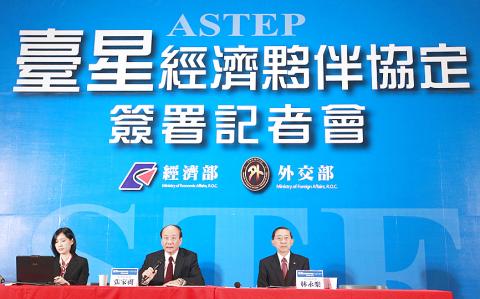Taiwan yesterday signed a far-reaching free-trade agreement (FTA) with Singapore — the first of its kind with a Southeast Asian country — in a move the government said would boost the nation’s efforts to pursue further economic engagement with trading partners bilaterally and multilaterally.
“This is a milestone achievement for Taiwan’s progress toward economic liberalization and our participation in regional economic integration,” Minister of Economic Affairs Chang Chia-juch (張家祝) told a press conference at 11am in Taipei.
Minister of Foreign Affairs David Lin (林永樂) said the agreement demonstrated Taiwan’s commitment to trade and investment liberalization to the global community.

Photo: Pichi Chuang, Reuters
The agreement “serves as an example” for Taiwan’s negotiation with other countries to sign economic cooperation agreements, Lin said.
“It could also trigger a domino effect” by encouraging other countries to open talks with Taiwan on similar trade accords, Lin added.
The pact — called the Agreement between Singapore and the Separate Customs Territory of Taiwan, Penghu, Kinmen and Matsu on Economic Partnership (ASTEP) — was signed by Representative to Singapore Fadah Hsieh (謝發達) and Singaporean Trade Representative to Taiwan Calvin Eu at a ceremony held at 9:30am in Singapore.
With Beijing’s insistence that FTAs can only be concluded among sovereign states, Taiwan has to conclude FTA-like agreements under a different name, such as the Agreement between New Zealand and the Separate Customs Territory of Taiwan, Penghu, Kinmen and Matsu on Economic Cooperation signed in August.
The exceptions are the four FTAs that Taiwan has with five diplomatic allies in Central America — Panama, Guatemala, Nicaragua, El Salvador and Honduras.
Billed by the government as a comprehensive, “high-standard” and “high-quality” trade agreement, the ASTEP contains 17 chapters, covering market access conditions for trade in goods, cross-border trade in services, government procurement and e-commerce; issues related to trade rules — technical barriers to trade, rules of origin, foreign investment, competition policies, trade remedies, customs procedures, sanitary and phytosanitary measures, and transparency; cooperation in intellectual property protection; and dispute settlement provisions.
Taiwan will remove 99.48 percent of its tariff lines within 15 years at the latest, with the exception of 40 agricultural products, including rice, mangoes, garlic, shiitake mushrooms, red beans, shelled ground-nuts and liquid milk.
Once the agreement takes effect, expected early next year, Taiwan will provide Singapore immediate tariff-free access to 65.97 percent of its agricultural products and 87.39 percent of its industrial products, while duties on the rest of the products will be reduced in three stages over a 15-year period.
The tariff cuts will have a limited impact on Taiwan’s agricultural sector because Singapore is not an agriculture-based economy, he said.
Chang added that throughout the two-and-a-half years of negotiations, Taiwan pressed for a longer tariff phase-out period to give less-competitive, domestic-oriented industries, such as auto parts, engines, motorcycles, towels and cotton clothing, time to adjust.
In return, Singapore, which has a very open trading regime that levies tariffs on only six beverage products, extended zero tariffs to all imports from Taiwan.
Both countries also agreed to adopt a “negative list” — as opposed to the “positive list” used in the WTO’s General Agreement on Trade in Services — to provide greater market access to investors from the other country. Under this set-up, the two countries agreed to open all their service sectors, unless specifically excluded by each country in an annex to the agreement.
Taiwan’s negative investment list covers 30 sectors in transportation, telecommunication and professional services, while Singapore has 35 sectors on its list related to healthcare and transportation, among others.
Both countries agreed to go beyond their respective WTO commitments in certain service sectors, including research and development service, general engineering and Type I telecommunications enterprises, while applying their commitments under the WTO to the finance industry under the bilateral agreement.
The agreement is expected to add US$701 million to Taiwan’s GDP over the next 15 years, boosting domestic output by NT$42.1 billion (US$1.43 billion) and creating 6,154 jobs, Chang said, citing a study conducted by the Chung-Hua Institution for Economic Research (中華經濟研究院).
Lin said that aside from signing FTAs with its main trade partners, Taiwan’s ultimate goal is to participate in regional economic integration through agreements such as the Trans-Pacific Partnership (TPP) and the Regional Comprehensive Economic Partnership (RCEP) — both possible pathways to the formation of an Asia-Pacific free-trade area.
“We will contact each member involved in TPP and RCEP negotiations and conclude agreements with them one by one,” Lin said.
Taiwan has completed feasibility studies on signing FTA-like pacts with India and Indonesia. Another one on trade with the Philippines is expected to be completed in the near future, Lin said.

NO-LIMITS PARTNERSHIP: ‘The bottom line’ is that if the US were to have a conflict with China or Russia it would likely open up a second front with the other, a US senator said Beijing and Moscow could cooperate in a conflict over Taiwan, the top US intelligence chief told the US Senate this week. “We see China and Russia, for the first time, exercising together in relation to Taiwan and recognizing that this is a place where China definitely wants Russia to be working with them, and we see no reason why they wouldn’t,” US Director of National Intelligence Avril Haines told a US Senate Committee on Armed Services hearing on Thursday. US Senator Mike Rounds asked Haines about such a potential scenario. He also asked US Defense Intelligence Agency Director Lieutenant General Jeffrey Kruse

FAST RELEASE: The council lauded the developer for completing model testing in only four days and releasing a commercial version for use by academia and industry The National Science and Technology Council (NSTC) yesterday released the latest artificial intelligence (AI) language model in traditional Chinese embedded with Taiwanese cultural values. The council launched the Trustworthy AI Dialogue Engine (TAIDE) program in April last year to develop and train traditional Chinese-language models based on LLaMA, the open-source AI language model released by Meta. The program aims to tackle the information bias that is often present in international large-scale language models and take Taiwanese culture and values into consideration, it said. Llama 3-TAIDE-LX-8B-Chat-Alpha1, released yesterday, is the latest large language model in traditional Chinese. It was trained based on Meta’s Llama-3-8B

STUMPED: KMT and TPP lawmakers approved a resolution to suspend the rate hike, which the government said was unavoidable in view of rising global energy costs The Ministry of Economic Affairs yesterday said it has a mandate to raise electricity prices as planned after the legislature passed a non-binding resolution along partisan lines to freeze rates. Chinese Nationalist Party (KMT) lawmakers proposed the resolution to suspend the price hike, which passed by a 59-50 vote. The Taiwan People’s Party (TPP) voted with the KMT. Legislative Speaker Han Kuo-yu (韓國瑜) of the KMT said the resolution is a mandate for the “immediate suspension of electricity price hikes” and for the Executive Yuan to review its energy policy and propose supplementary measures. A government-organized electricity price evaluation board in March

NOVEL METHODS: The PLA has adopted new approaches and recently conducted three combat readiness drills at night which included aircraft and ships, an official said Taiwan is monitoring China’s People’s Liberation Army (PLA) exercises for changes in their size or pattern as the nation prepares for president-elect William Lai’s (賴清德) inauguration on May 20, National Security Bureau (NSB) Director-General Tsai Ming-yen (蔡明彥) said yesterday. Tsai made the comment at a meeting of the Legislative Yuan’s Foreign Affairs and National Defense Committee, in response to Democratic Progressive Party (DPP) Legislator Wang Ting-yu’s (王定宇) questions. China continues to employ a carrot-and-stick approach, in which it applies pressure with “gray zone” tactics, while attempting to entice Taiwanese with perks, Tsai said. These actions aim to help Beijing look like it has